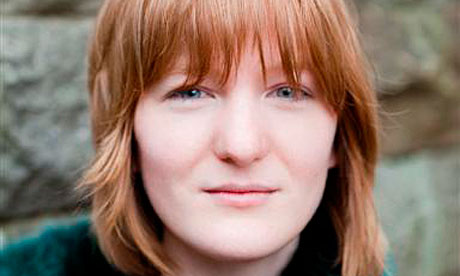
In defiance of some tricky technological issues – for which please accept additional apologies – we assembled a stack of tasty nominations for the 10th slot on the first book award longlist. From Helen Cadbury's "pithy little state of the nation book" To Catch a Rabbit to Andy Harrod's "difficult to categorise" Tearing at Thoughts and from Sam Byer's "scathing, savagely brilliant satire of modern life" Idiopathy to Leon Hughes's "beautiful, haunting" Wings of Contrition the list spanned the publishing universe from literary crime to experimental poetry, from big publisher to self-publisher.
With such an eclectic list, full of authors and publishers I'm discovering for the first time – shout out to the folks at Crooked Cat Publishing – it's invidious to pick out anything from the pile, but I'm going to do it anyway. Who could resist the daffy energy of Sharon Baillie's unstable chemist Veronica Dempsey in the novel Magenta Opium, published by New Libri Press:
Twenty-two year old, average weight, average height, average brown hair, average brown eyes, average bowel movements, average heart rate, average eyelash length, average top speed, above average recall, less than average social intellect, Veronica Dempsey had never experienced the touch of love. As she was more interested in turbidity than turgidity, this fact was neither here nor there. She hadn't fallen off a mountain either, nor stepped into traffic in full flow, nor learned Für Elise on the piano, nor visited the continent, nor ate Marmite, scallops or beef Pot Noodle …
This "zany, black comedy, lightly peppered with sex, chemistry, and sex chemistry" may not have particularly likeable characters, as mrsmorden says, but Baillie's wordplay fizzes along past dead bodies, vandalism and laboratory shenanigans. "Don't be misled by the pink cover," mrsmorden concludes. "Like the well-known chocolate bar, this book's not for girls. It truly punches above its weight."
There's more fighting talk from Rhian E Jones, whose Clampdown argues that popular culture has inverted over the last 30 years to reflect the voices of the powerful instead of voices from the margins:
For many there has always been poverty, precarity, petty criminality and police animosity, but the years since the crisis of 2008 have exacerbated their reach and increased their visibility, resulting in their sudden horrified pointing out by those who might previously have missed them due to being shielded by better prospects and broader horizons. At the same time, under the Coalition, the demise of upwards aspiration and social mobility, and the doublethink, delusion or deceit involved in the assertion of classlessness have put an end to the affirmative, if blithely ignorant, appropriation of working-class signifiers which was encouraged in the Blair years. Now that things are going badly, poor is no longer cool, merely comical or contemptible.
Key into Jones's quickfire, rat-a-tat, cultural-studies delivery and this book "bubbles like a boiling pot on a stove" as ID5591424 suggests. At only 97 pages, perhaps "everybody who cares about society and the arts needs to read this" after all.
There's raw power of a different sort in Eimear McBride's beautifully-produced A Girl is a Half-formed Thing. Pitched into the head of an unnamed narrator, the reader rolls in the sway of a chaotic life in rural Ireland:
I take the bus home reeling over me. That's a feeling. Frighten brilliant new. I am just head on the pillow when she phone. The bring bring. It's half past nine. I'll sleep but landlady whack. You. You. Your mother's on the phone. She's been calling half the night don't let me say it again. Sorry.
It's certainly dark, as ID615949 admits, but the way McBride replicates thought "as it occurs: starting, stopping, jolting, flowing, jumping back and forth" is immensely impressive.
Which brings us on to the Anglo-Breton poet Claire Trévien, whose collection of poems, The Shipwrecked House, has – after much deliberation – been selected for the first book award longlist. Trévien's subjects range from Cyrano de Bergerac's defiant "fuck you to Death" to Great British Bake-Off tweets, from communion wine to a skit on the death of the author, couched in verses which stretch from a straightforward(ish) sonnet to a fractured riff on the violin and beyond to a disintegration of Antony Gormley's Another Place which evaporates towards nothingness over the space of four pages.
We're never far from the ocean, which creaks to a halt and solidifies in "Rusty Sea":
Saturday, the sea turned brown, shutters clattered / closed to keep the stink out. Dead fish burst to the surface, / seagulls flew so far in they forgot to return. Weeds clambered / up, tentacles piercing the plane, midges drew laced / patterns in the sky. We waited for the tide to start again.
Or washes up on stage in the delta-wing "Mélusine", a "human" above, but "below … a snake wrapped round a cello":
… in her hands she holds a crop to scald / the beast of wood and string. The stage is strewn with the wreckage / of a strange ship: amps, and wires teased into stands, lights blinkered, caged …
Or surges up from below, like the whales which "lived under our house", though "the carpet looked too smooth to hide a mammal":
Most of the time they just wanted to play / bounced against bookshelves, snorted leaks, / threw bodies across the room.
It's certainly "both accessible and slanting … A page-turner and a slow-burner at the same time" as caramail suggests, and goes forward to the first book award longlist with hearty congratulations to Claire Trévien, and to all at Penned in the Margins. And thanks for all your nominations, which have thrown up such a fascinating and varied cross-section of publishing life. I can't wait to see how The Shipwrecked House measures up against the rest of the longlist.

